江苏省永丰初级中学牛津译林版九年级英语下册课件:Unit 1 Welcome to the unit(共32张PPT)
文档属性
| 名称 | 江苏省永丰初级中学牛津译林版九年级英语下册课件:Unit 1 Welcome to the unit(共32张PPT) |  | |
| 格式 | zip | ||
| 文件大小 | 11.8MB | ||
| 资源类型 | 教案 | ||
| 版本资源 | 牛津译林版 | ||
| 科目 | 英语 | ||
| 更新时间 | 2022-05-24 15:58:28 | ||
图片预览

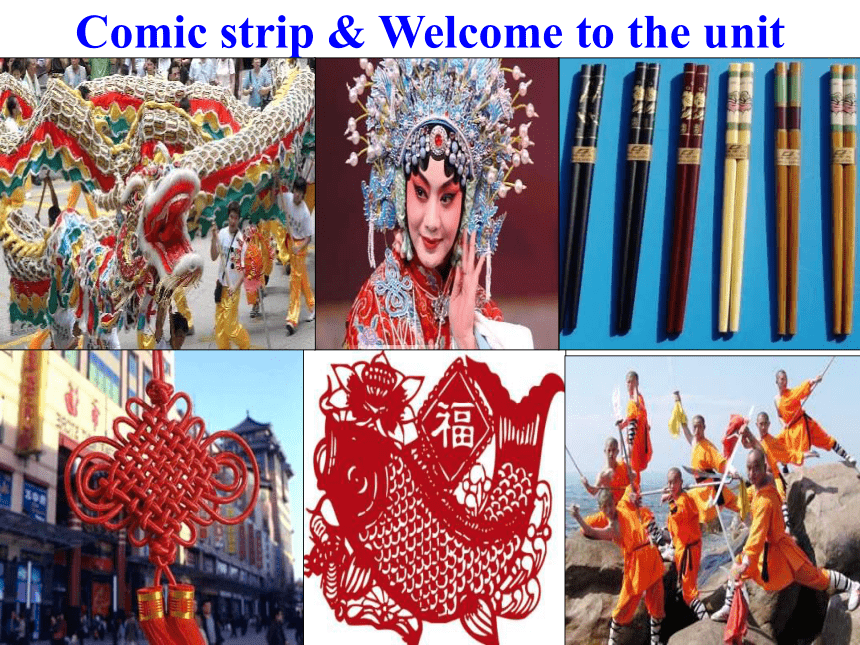
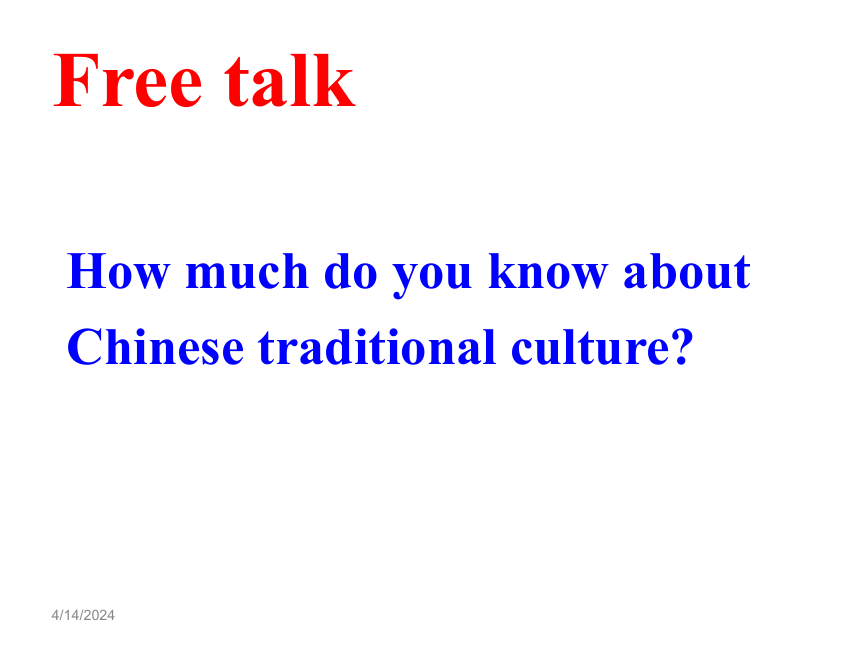
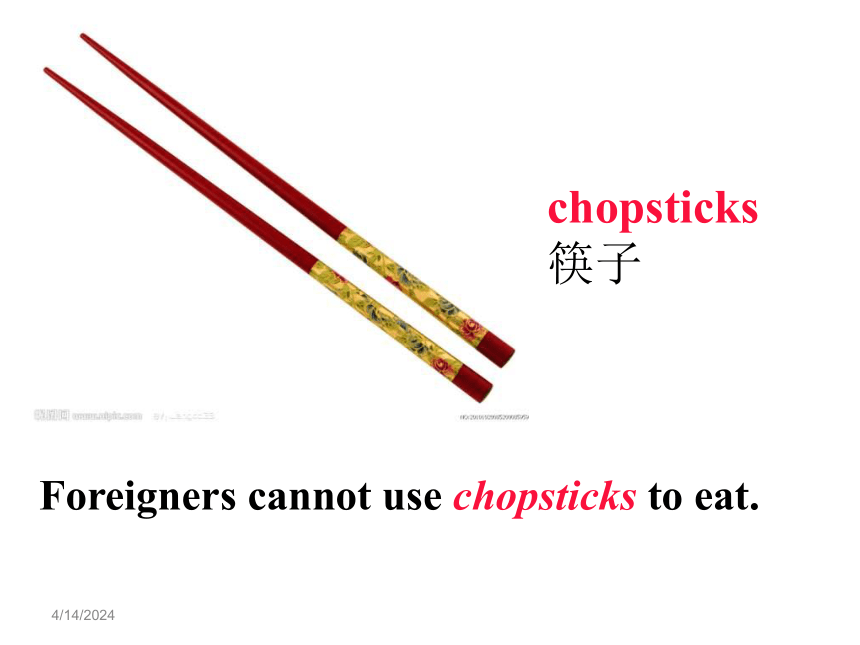
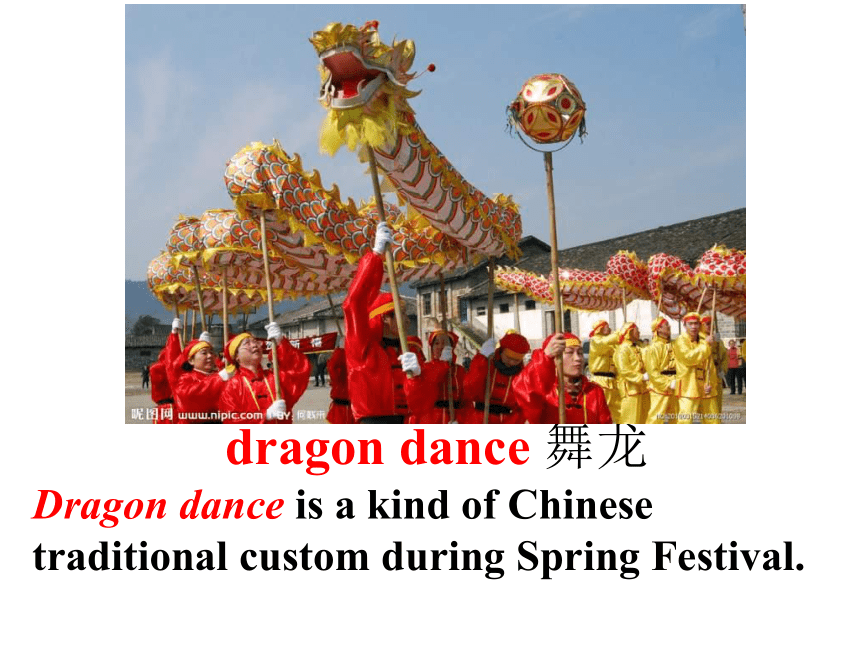
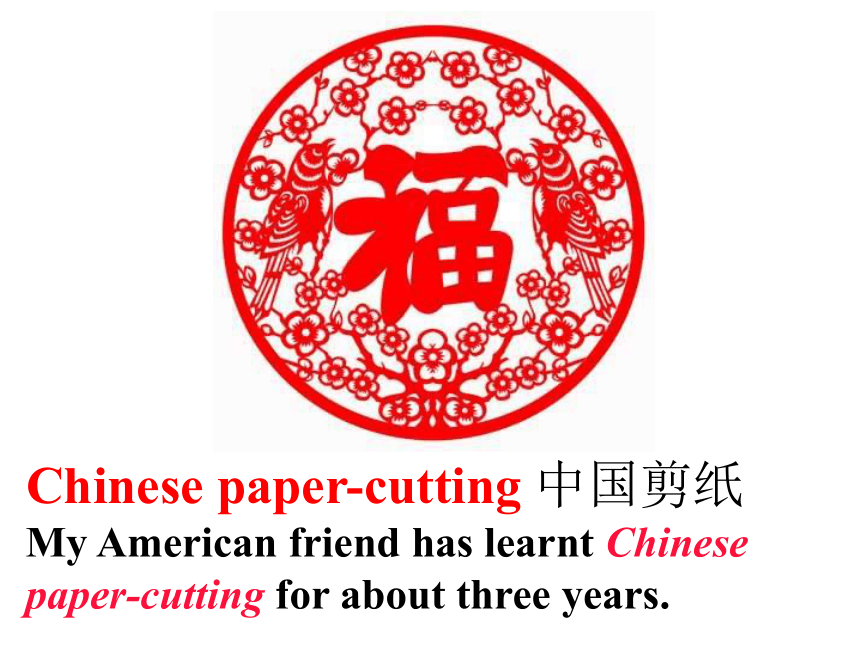
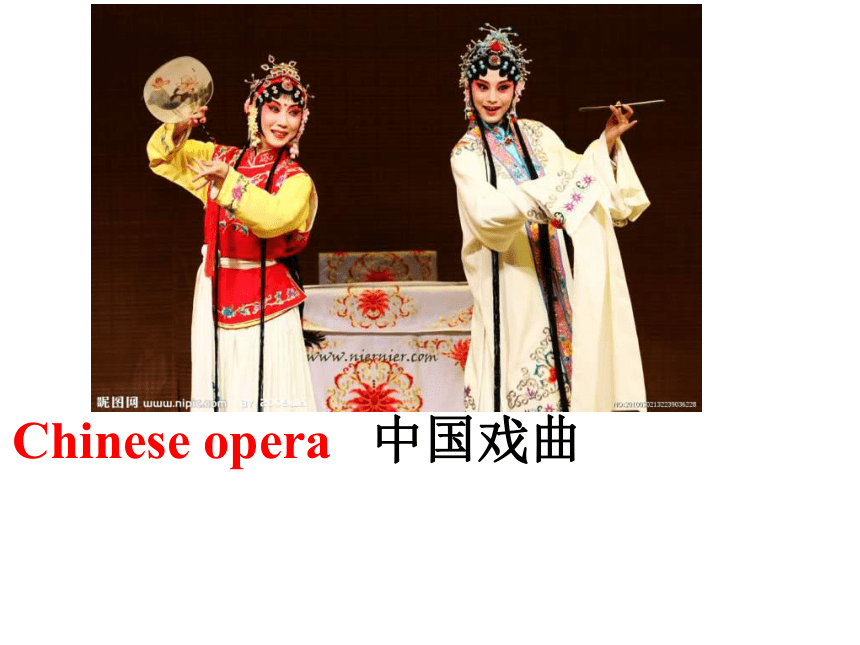
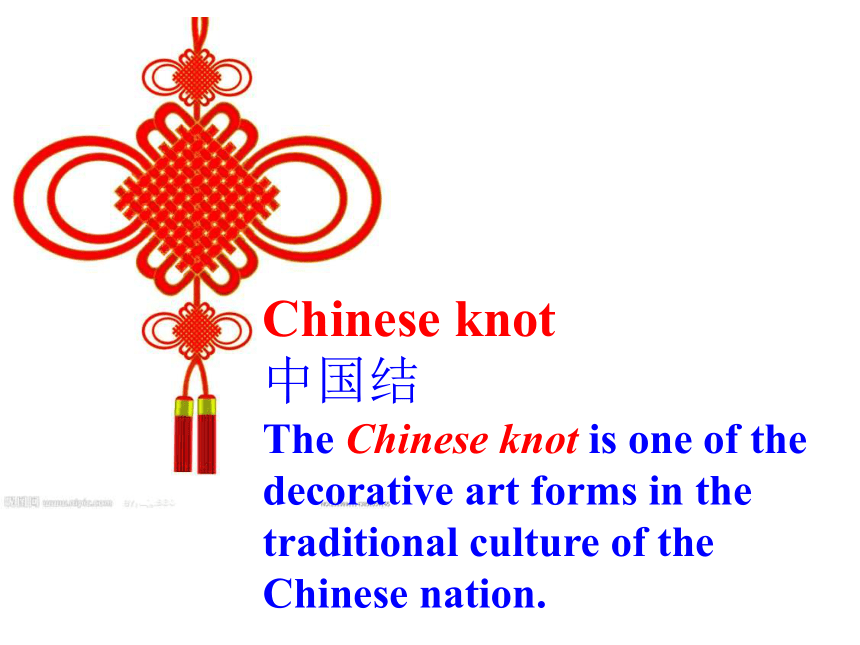
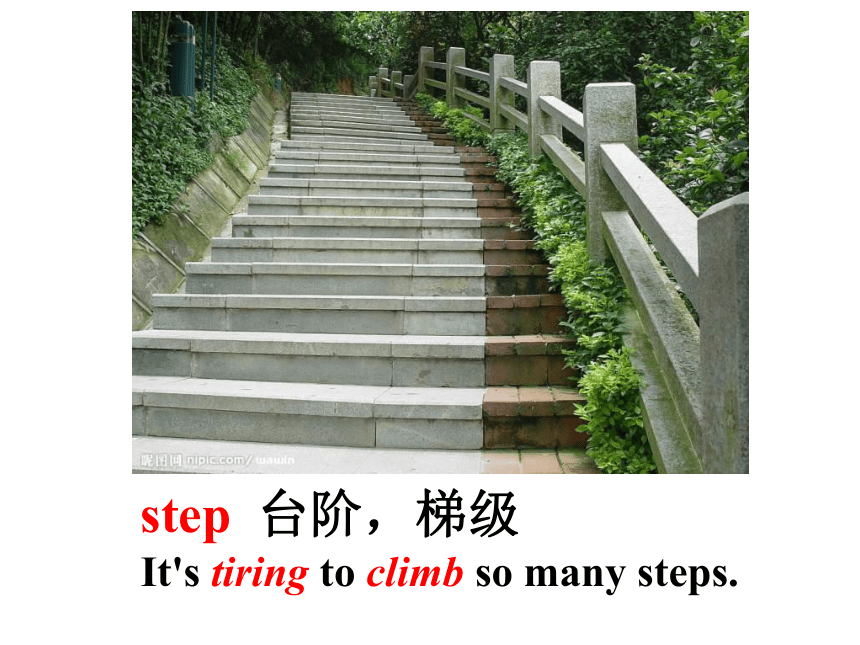
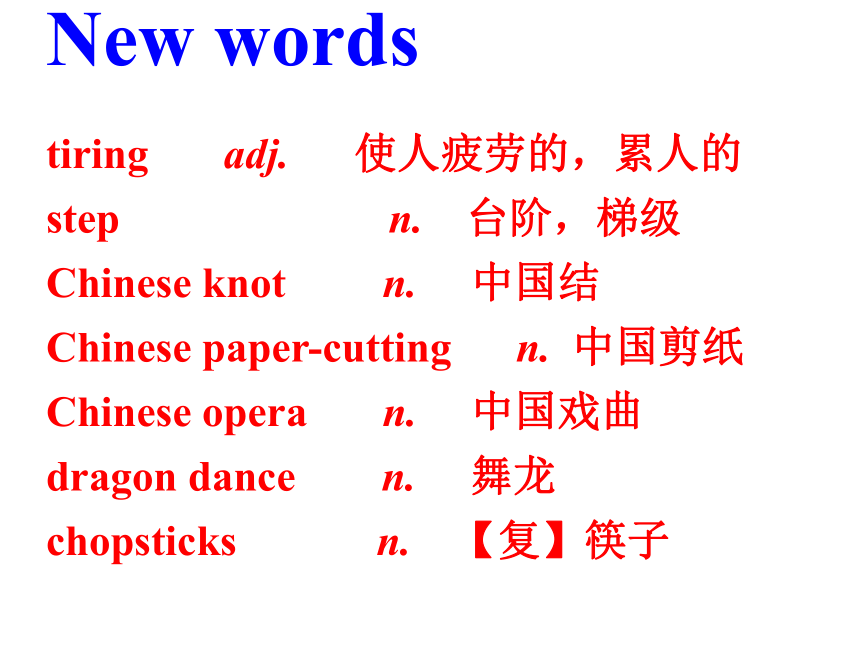

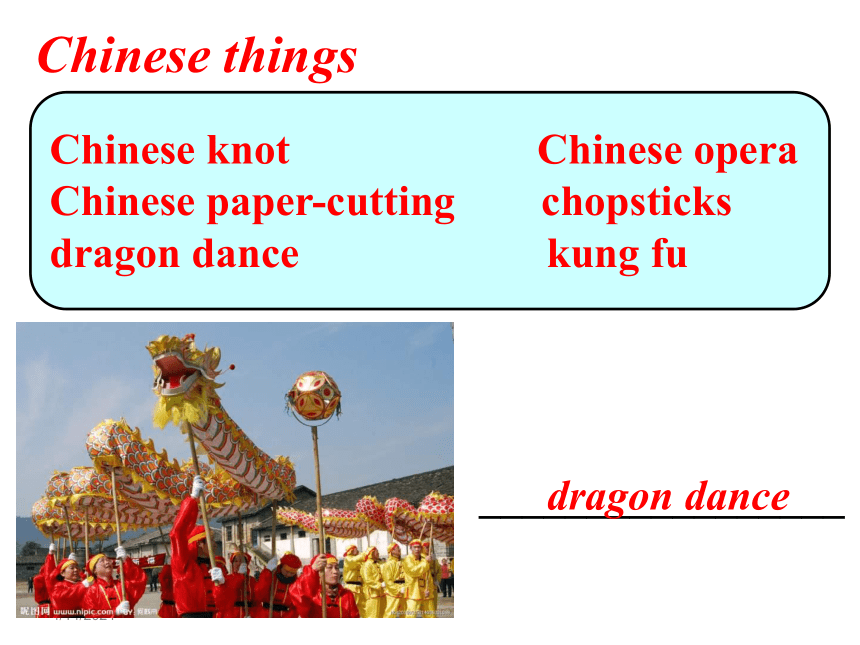
文档简介
(共32张PPT)
*
9下 Unit 1 Asia
Welcome to the unit
*
Comic strip & Welcome to the unit
*
Free talk
How much do you know about
Chinese traditional culture
*
Foreigners cannot use chopsticks to eat.
chopsticks
筷子
dragon dance 舞龙
Dragon dance is a kind of Chinese traditional custom during Spring Festival.
Chinese paper-cutting 中国剪纸
My American friend has learnt Chinese paper-cutting for about three years.
Chinese opera 中国戏曲
Chinese knot
中国结
The Chinese knot is one of the decorative art forms in the
traditional culture of the
Chinese nation.
step 台阶,梯级
It's tiring to climb so many steps.
New words
tiring adj. 使人疲劳的,累人的
step n. 台阶,梯级
Chinese knot n. 中国结
Chinese paper-cutting n. 中国剪纸
Chinese opera n. 中国戏曲
dragon dance n. 舞龙
chopsticks n. 【复】筷子
*
The British exchange students have arrived in Beijing. Millie is showing them some pictures of Chinese things. Help her write the correct name under each picture.
*
Chinese things
_________________
dragon dance
Chinese knot Chinese opera
Chinese paper-cutting chopsticks
dragon dance kung fu
*
Chinese things
_________________
Chinese opera
Chinese knot Chinese opera
Chinese paper-cutting chopsticks
dragon dance kung fu
*
Chinese things
_________________
chopsticks
Chinese knot Chinese opera
Chinese paper-cutting chopsticks
dragon dance kung fu
*
Chinese things
_____________________
Chinese paper-cutting
Chinese knot Chinese opera
Chinese paper-cutting chopsticks
dragon dance kung fu
*
Chinese things
_________________
Chinese knot
Chinese knot Chinese opera
Chinese paper-cutting chopsticks
dragon dance kung fu
*
Chinese things
_________________
kung fu
Chinese knot Chinese opera
Chinese paper-cutting chopsticks
dragon dance kung fu
*
If your foreign friend asks you for suggestions on his/her travel plan in China, what will you advise him/her to see and where will you advise him/her to visit
Free talk
*
Kevin, a British exchange student, is asking Millie for her suggestions on his travel plan.
Listen to the tape and answer the following questions:
1. Where does Millie suggest visiting first
2. What special things can we see if we are
in Beijing
*
1. Where does Millie suggest visiting first
2. What special things can we see if we are
in Beijing
Beijing. Tian'anmen Square, the Palace Musuem and the Great wall are wonderful places to go.
Chinese opera, especially Beijing opera .
*
Work in pairs and give your own ideas about Kevin's travel plan.
Use the conversation in Part B as a model.
*
Free talk
Would Eddie like to go travelling
*
Listen and answer:
Where are Eddie and Hobo
What does Eddie think of the trip
Will Eddie stick it out
They are on the Great Wall.
He thinks the trip is tiring.
No.
*
Read the dialogue follow the tape in chorus.
Read the dialogue follow the tape in roles.
*
*
Language points:
1. The Great Wall is amazing, isn't it 长城太神奇了,不是吗?
【概念】
反意疑问句是由陈述句和附在其后的附加疑问句组成。其中附加疑问句是对陈述句所说的事实或观点提出疑问,起证实作用,一般用于证实说话者所说的事实或观点。
*
Language points:
1. The Great Wall is amazing, isn't it 长城太神奇了,不是吗?
【注意要点】
1、反意疑问句前后两部分谓语应是:“肯定陈述+否定疑问”或“否定陈述+肯定疑问”。
2、简略问句如果是否定式:not应与be,do,will等系动词、助动词、情态动词缩写。
3、简略问句的主语不用名词,应用人称代词。
4、陈述部分含“too...to”时,是否定句。
*
Language points:
1. The Great Wall is amazing, isn't it 长城太神奇了,不是吗?
【练习】 (1)There is little juice in the glass, ______
A. is there B. isn’t there C. is it
(2)---You’re new here, ________
---Yes, I’m from Dujiangyan.
I came here last week.
A. do you B. don’t you C. are you D. aren’t you
A
D
*
2. We'd better keep moving. 我们最好坚持走。
had better do sth 最好做某事
had better后接动词的原形
e.g. 我最好在妈妈到家前完成家庭作业。
I'd better finish my homework before mom gets home.
keep doing sth. 坚持做某事,一直做某事
e.g. He kept talking until the meeting was over.他一直在说,直到会议结束。
Language points:
*
3. I don't want to go on. 我不想继续了。
go on doing sth .指继续做同一件事 如:
After a short rest , they went on working. 短暂休息之后,他们继续工作。
go on with sth . 指继续同一件事,此时with 后能接名词,代词,不能跟ing 形式。如: After a short rest ,they went on with the work . 短暂休息之年,他们继续那项工作。
go on to do sth . 指接着做另外一件事。如:
After finishing the words , they went on to go over the
text. 结束单词后,他们接着通课文。
Language points:
*
1. — He seldom came here, _____
— Yes sir.
A. didn’t he B. does he
C. doesn’t he D. did he
2. You'd better _________ (return) the book at once.
3. He kept __________ (cough) all morning.
Exercises
D
return
coughing
*
翻译下列句子。
开会时他一直站着。
2.你最好听你父母的话。
3.我们下午去购物吧,好吗?
He kept standing during the meeting.
You'd better listen to your parents.
Let's go shopping this afternoon, shall we
*
9下 Unit 1 Asia
Welcome to the unit
*
Comic strip & Welcome to the unit
*
Free talk
How much do you know about
Chinese traditional culture
*
Foreigners cannot use chopsticks to eat.
chopsticks
筷子
dragon dance 舞龙
Dragon dance is a kind of Chinese traditional custom during Spring Festival.
Chinese paper-cutting 中国剪纸
My American friend has learnt Chinese paper-cutting for about three years.
Chinese opera 中国戏曲
Chinese knot
中国结
The Chinese knot is one of the decorative art forms in the
traditional culture of the
Chinese nation.
step 台阶,梯级
It's tiring to climb so many steps.
New words
tiring adj. 使人疲劳的,累人的
step n. 台阶,梯级
Chinese knot n. 中国结
Chinese paper-cutting n. 中国剪纸
Chinese opera n. 中国戏曲
dragon dance n. 舞龙
chopsticks n. 【复】筷子
*
The British exchange students have arrived in Beijing. Millie is showing them some pictures of Chinese things. Help her write the correct name under each picture.
*
Chinese things
_________________
dragon dance
Chinese knot Chinese opera
Chinese paper-cutting chopsticks
dragon dance kung fu
*
Chinese things
_________________
Chinese opera
Chinese knot Chinese opera
Chinese paper-cutting chopsticks
dragon dance kung fu
*
Chinese things
_________________
chopsticks
Chinese knot Chinese opera
Chinese paper-cutting chopsticks
dragon dance kung fu
*
Chinese things
_____________________
Chinese paper-cutting
Chinese knot Chinese opera
Chinese paper-cutting chopsticks
dragon dance kung fu
*
Chinese things
_________________
Chinese knot
Chinese knot Chinese opera
Chinese paper-cutting chopsticks
dragon dance kung fu
*
Chinese things
_________________
kung fu
Chinese knot Chinese opera
Chinese paper-cutting chopsticks
dragon dance kung fu
*
If your foreign friend asks you for suggestions on his/her travel plan in China, what will you advise him/her to see and where will you advise him/her to visit
Free talk
*
Kevin, a British exchange student, is asking Millie for her suggestions on his travel plan.
Listen to the tape and answer the following questions:
1. Where does Millie suggest visiting first
2. What special things can we see if we are
in Beijing
*
1. Where does Millie suggest visiting first
2. What special things can we see if we are
in Beijing
Beijing. Tian'anmen Square, the Palace Musuem and the Great wall are wonderful places to go.
Chinese opera, especially Beijing opera .
*
Work in pairs and give your own ideas about Kevin's travel plan.
Use the conversation in Part B as a model.
*
Free talk
Would Eddie like to go travelling
*
Listen and answer:
Where are Eddie and Hobo
What does Eddie think of the trip
Will Eddie stick it out
They are on the Great Wall.
He thinks the trip is tiring.
No.
*
Read the dialogue follow the tape in chorus.
Read the dialogue follow the tape in roles.
*
*
Language points:
1. The Great Wall is amazing, isn't it 长城太神奇了,不是吗?
【概念】
反意疑问句是由陈述句和附在其后的附加疑问句组成。其中附加疑问句是对陈述句所说的事实或观点提出疑问,起证实作用,一般用于证实说话者所说的事实或观点。
*
Language points:
1. The Great Wall is amazing, isn't it 长城太神奇了,不是吗?
【注意要点】
1、反意疑问句前后两部分谓语应是:“肯定陈述+否定疑问”或“否定陈述+肯定疑问”。
2、简略问句如果是否定式:not应与be,do,will等系动词、助动词、情态动词缩写。
3、简略问句的主语不用名词,应用人称代词。
4、陈述部分含“too...to”时,是否定句。
*
Language points:
1. The Great Wall is amazing, isn't it 长城太神奇了,不是吗?
【练习】 (1)There is little juice in the glass, ______
A. is there B. isn’t there C. is it
(2)---You’re new here, ________
---Yes, I’m from Dujiangyan.
I came here last week.
A. do you B. don’t you C. are you D. aren’t you
A
D
*
2. We'd better keep moving. 我们最好坚持走。
had better do sth 最好做某事
had better后接动词的原形
e.g. 我最好在妈妈到家前完成家庭作业。
I'd better finish my homework before mom gets home.
keep doing sth. 坚持做某事,一直做某事
e.g. He kept talking until the meeting was over.他一直在说,直到会议结束。
Language points:
*
3. I don't want to go on. 我不想继续了。
go on doing sth .指继续做同一件事 如:
After a short rest , they went on working. 短暂休息之后,他们继续工作。
go on with sth . 指继续同一件事,此时with 后能接名词,代词,不能跟ing 形式。如: After a short rest ,they went on with the work . 短暂休息之年,他们继续那项工作。
go on to do sth . 指接着做另外一件事。如:
After finishing the words , they went on to go over the
text. 结束单词后,他们接着通课文。
Language points:
*
1. — He seldom came here, _____
— Yes sir.
A. didn’t he B. does he
C. doesn’t he D. did he
2. You'd better _________ (return) the book at once.
3. He kept __________ (cough) all morning.
Exercises
D
return
coughing
*
翻译下列句子。
开会时他一直站着。
2.你最好听你父母的话。
3.我们下午去购物吧,好吗?
He kept standing during the meeting.
You'd better listen to your parents.
Let's go shopping this afternoon, shall we
